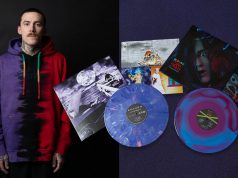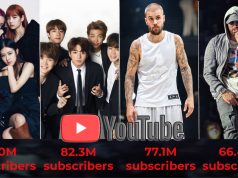When Eminem announced in late August that his new album would be titled the Marshall Mathers LP 2, the significance—coming back to the scene of his best-selling album, the return of his bleach-blonde hair, the throwback to his early days—was not lost on anyone. But when Marshall premiered his first single, the Rick Rubin-helmed “Berzerk,” on Shade 45 the next day, it seemed like Em, one of the greatest rappers of all time and coming off another multi-platinum record with 2010′s Recovery, was out of date and not up to speed. The following singles—the Call Of Duty promo track “Survival,” the 100-mile-a-minute sprint of “Rap God,” the Rihanna-assisted radio bait “The Monster”—divided opinion like no other project this year. When the album inevitably leaked last Wednesday (October 30) ahead of its November 5 release date, most people had seemingly already made up their minds about this new version of Eminem’s vision.
The full MMLP2—a revisit, rather than a sequel, of his 2000 Marshall Mathers LP—is a much different animal than the first, and is also much more diverse than any of his other albums. The Rick Rubin influence cannot be overstated—”Berzerk,” of course, feels like a Beastie Boys outtake, and his other samples of Joe Walsh, the Steve Miller Band, and Wayne Fontana and the Mindbenders, to name a few, are something that only Rubin could helm—and the production as a whole is largely out of left field. Sometimes when listening through, you could catch yourself thinking that the opening of the next song—”Legacy,” for instance—was the beginning of a Spotify ad from a playlist you forgot you had on. But the thing that carries Em through is the diversity of his flows, and his ability to rap over anything, regardless of if you think it could be done.
Take “Love Game,” for instance, the first track that hit the web after the leak and the album’s most anticipated song after the credits revealed that Kendrick Lamar would be the only featured rapper on the LP. That Wayne Fontana loop is way more “You’re The One That I Want” than “The Way I Am” or “Stan,” to name two standouts from the first Marshall Mathers, and on first listen in an office environment it seems a touch forced and out of place. But walking down the street at noon on a Saturday and hearing Kendrick’s and Em’s verses over a swaying, 1950s-era rockabilly beat gives that track an entirely different dimension. Songs like “Rhyme Or Reason” and “So Far” are similar in that way—they’ll grow on you by getting stuck in your head, and before long you’ll know every word and skip ahead to hear the familiar refrains and deft flows.
And then there’s the lyrical content, maybe most fascinating when taking into context the album’s position as a revisitation to the first iteration 13 years ago. A song like “Kill You” off the first Marshall Mathers is countered by a track like “Headlights,” which follows the formula that Em has cultivated where he grabs a popular singers (this time fun.’s Nate Ruess) to sing the hooks of some of his biggest songs, a five-minute apology to his mother, directly referencing earlier tracks like “Cleaning Out My Closet.” It’s not that you’re getting a softer Eminem—there are still tracks like “So Much Better” which are full of the same amount of vitriol as some of his earlier work, and the emotion and power is not missing from MMLP2—but you’re getting one with more perspective, a version which has seen 13 more years and has a different outlook on some of the same topics that he first visited in 2000.
There are still problems with some of his lyrical content: the overt homophobia is still there, even though it’s addressed (albeit briefly) on album opener “Bad Guy,” and at this point it feels pointless to take issue with the violent content in his words. But for the most part, the way he addresses his own demons—particularly on “Bad Guy” and album closer “Evil Twin,” both of which see him battling alter ego Slim Shady—see Em delving into his intense issue within himself, a dichotomy which only he can articulate with such an uncomfortable clarity. “Evil Twin” is more or less a direct attack at Shady’s persona in 2000, a different character than exists in his own mind now, and contains his most telling lines of the whole album: “Sometimes I listen and revisit them old albums/Often as I can and skim through all them bitches/To make sure I keep up with my competition/Hoarder of beats, hoarder of rhymes/Borderline genius who’s bored of his lines/And that sort of defines where I’m at and the way I feel now.”
He’s in a new era, a new place, and he’s thinking more about his career and life in a larger context—and it defines where he’s at and what he is now. For a songwriter as open and honest as Eminem, love it or hate it, that’s always what he’ll bring. Marshall Mathers is in a never-ending battle with Slim Shady. For better or for worse. –Dan Rys













